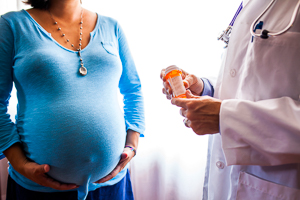Toxoplasmosis During Pregnancy
Overview

Toxoplasmosis is a common infection caused by a parasite. You get it from eating undercooked meat, eating unwashed vegetables (grown where an infected cat has left droppings), or touching infected cat droppings.
Most healthy people who get the disease don't know they have it. It is very mild. But problems can happen when you are pregnant and get the disease. It can cause serious problems in an unborn baby. If you are pregnant, take steps to prevent infection.
Your unborn baby may not get infected even if you get toxoplasmosis while pregnant. If tests show that your unborn baby is infected, your doctor will prescribe antibiotics. After you have been infected, you can't get the disease again.
Steps you can take to prevent toxoplasmosis
Toxoplasmosis during pregnancy can put your baby at risk for serious problems. Infection usually occurs from contact with infected cat feces or from eating undercooked meat or unwashed vegetables (grown where an infected cat has left droppings).
Everyone should take steps to prevent food poisoning by storing and preparing foods properly. In addition, pregnant women need to take these extra steps to prevent toxoplasmosis.
- If you have a cat, ask someone else to clean the litter box while you are pregnant.
If no one else can do it, wear gloves and clean the litter box daily. Wash your hands well with soap and warm water afterward.
- Wear gloves when working in the garden or handling soil.
Wash your hands well with soap and warm water after outdoor activities, especially before you eat or prepare food.
- Wash all foods that could have touched cat droppings.
This includes fruits and vegetables you buy at the store.
- Have someone else handle raw meat for you.
If this is not possible, wear clean disposable gloves when you touch raw meat. Wash cutting boards, sinks, knives, and other utensils that might have touched the raw meat. Wash your hands well with soap and warm water afterward.
- Make sure the meat you eat is well-cooked.
Use a meat thermometer to be sure foods are cooked to a safe temperature.
- Avoid untreated drinking water.
This is a concern when you are in the wilderness or travel to countries where drinking water is not treated.
Credits
Current as of: November 9, 2022
Author: Healthwise Staff
Clinical Review Board:
Sarah Marshall MD - Family Medicine
Adam Husney MD - Family Medicine
E. Gregory Thompson MD - Internal Medicine
Kathleen Romito MD - Family Medicine
Kirtly Jones MD - Obstetrics and Gynecology
Current as of: November 9, 2022
Author: Healthwise Staff
Medical Review:Sarah Marshall MD - Family Medicine & Adam Husney MD - Family Medicine & E. Gregory Thompson MD - Internal Medicine & Kathleen Romito MD - Family Medicine & Kirtly Jones MD - Obstetrics and Gynecology
